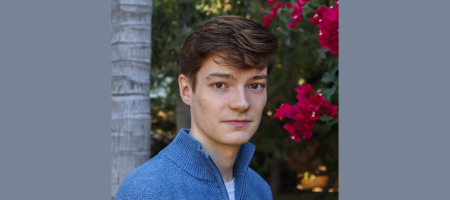Student Spotlight – J.W. Clark
Meet fourth-year undergraduate researcher J.W. Clark!
J.W. majors in Musicology with a minor in Philosophy and is in our Undergraduate Research Scholarship Program. The title of their project is “Voicing the Fox: The Zoopolitics of (Re)presenting Vulpine Bodies,” which draws on a number of disciplines including literary studies and critical theory, biosemiotics and behavioral ethology, and analytical philosophy and art history.
How did you first get interested in your research project?
During my first quarter at UCLA as a new transfer student, I was lucky enough to be able to attend my first academic conference – the annual meeting of the American Musicological Society. The first panel of the weekend that I attended was titled “Plants and Animals”; at the time, the panel’s content struck me as incredibly peculiar for musicological work, with such papers as “Becoming-Tree: Heine, Grieg, Sibelius, and Musical Arboreality” (Daniel Grimley) and “Of Donkeys, Dogs, and Schubert: The Sonic as a Meeting Place for Species” (Knar Abrahamyan). While the “cultural animal studies” have generated some worthwhile work in the humanities within the past few decades, at many institutions such approaches are still viewed by traditional musicologists as “fringe” topics, at least with regard to music scholarship. But hearing these rigorous papers at a high-profile national conference made me realize that nothing was really off-limits when it came to scholarship. The whole conference for me was like that; that weekend also marked the start of my serious engagement with feminist, queer, and critical race theory – all of the “New Musicology” – approaches to music scholarship, though nothing stuck with me quite as persistently as that first panel. I ended up picking up a copy of Rachel Mundy’s Animal Musicalities at the book expo on my way out, and from there I really began thinking in earnest about the “animal turn” and how I could bring that more into musicological discourse. I then wrote a course paper in the spring as a kind of test-run for this kind of approach, where I looked at Leoš Janáček’s The Cunning Little Vixen and how animal representation was operating there with regard to the opera’s libretto, score, and staging techniques. I really liked engaging with that line of inquiry and started getting into posthumanist/animal studies scholarship at around the same time, and that more or less laid the groundwork for my current project.
What has been the most exciting aspect of your research so far?
The sheer breadth of work I have had to dialogue with has introduced me to countless new fields and subfields of which I had little or no prior knowledge of beforehand. “Animal studies” is far from a unified area of research; particularly given the lack of existing music scholarship on my topic, I’ve been drawing on everything from literary studies and critical theory, to biosemiotics and behavioral ethology, to analytical philosophy and art history. It’s been an immensely rewarding process.
What has surprised you about your research or the research process?
I continue to be caught off-guard by the depth and pervasiveness of hegemony in the form of human exceptionalism; every time I think I’ve gotten to the bottom, something else comes along – a new comparison I hadn’t thought of, a nuanced apprehension of a certain relationship – and forces me to reevaluate what I think I know all over again. Getting “outside” anthropomorphisms is impossible given our status as humans, but at times it becomes incredibly easy to forget that that they exist. This is particularly the case when working with nonhuman animal representations in our artistic and cultural artefacts, given they are overwhelmingly ubiquitous in day-to-day life. This project has required a constant reimagination of what it would truly mean to relate to other species in a mutually respectful way.
What is one piece of advice you have for other UCLA students thinking about doing research?
A lot of people (myself included) tend to stress initially over finding a line of inquiry that hasn’t been done before – because there is so much scholarship out there, it often seems like there is nothing meaningful you can contribute to your given field, especially as an undergrad. Don’t worry about coming up with something uniquely “original” – reflect on what you’re already interested in and connect those existing strands to your discipline and to each other. In my opinion, the most exciting and productive scholarship emerges from individuals who employ their field to work for them, rather than imposing limits on their work to fit rigid disciplinary boundaries. At base, research, reading, and just expanding your horizons in general allows you to better and more rewardingly reterritorialize what you already have.
What effect do you hope your research has in your field, at UCLA, in your community, or in the world?
I’d like to push everyone who comes in contact with me and my work to scrutinize the habitual ways in which they navigate the world. We, as humans, have continued to orchestrate a horrifying genocide of mind-numbing proportions against those we have deemed to be “subhuman.” Most egregiously (though the least acknowledged) has been the violent subjugation of countless other animals, but comparable strategies have been and continue to be deployed against marginalized groups within our own species. Despite a popular conception to the contrary, music-making, and art general, is inherently political, and thus cannot be separated from such acts. Following Susan McHugh’s call to investigate how “forms of representation matter to the development of theories of species life” in her work on animal fictions, I hope to impress upon people the importance of critiquing how we look at, listen to, and talk about others.


